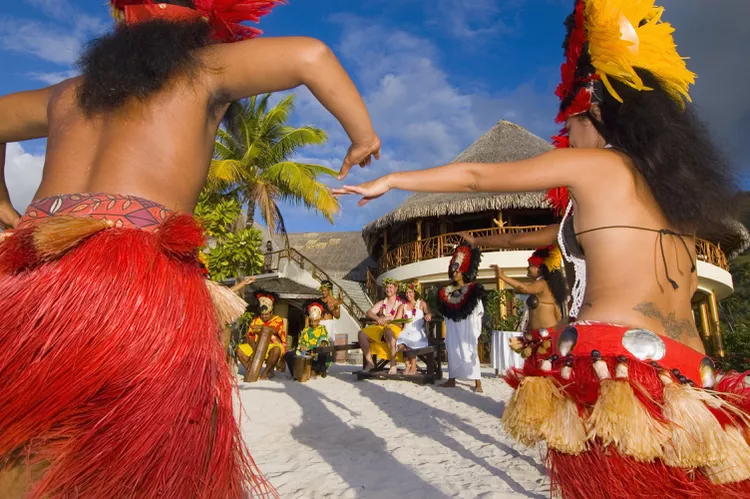Overview of Tahitian Phrases
French may be the official language of Tahiti, but the Tahitian te roa language is widely spoken by locals. It includes only 16 letters and 1,000 words, making it relatively simple to learn. Initially, just an oral language, Tahitian was committed to writing in 1810 by a Welsh linguist and historian named John Davis.
When it comes to speaking te roa, most vowels are pronounced, and all syllables end in vowels. An apostrophe indicates a short pause. For example, Faa’a International Airport is pronounced Fah-ah-ah. The R’s are rolled, and no letters are silent.
Although you’re likely to encounter the French language in most business places, and English is spoken at the resorts, it can be fun to learn some basic te roa greetings if you’re planning a trip to Tahiti, Moorea, or Bora Bora. The islanders themselves speak te roa, and Tahitians appreciate it when you arrive already knowing how to say “hello” and “thank you.” Below are some useful keywords and phrases to help you communicate effectively.
Some Common Helpful Terms
- Yes: E – pronounced ay, not as the English long vowel sound
- No: Aita – pronounced eye-tah
- Big: Nui – pronounced new-ee
- Small: Iti – pronounced ee-tee
- Look: A hi’o – pronounced ah-hee-oh
- Come here: Haere mai – pronounced ha-ay-ray my
- Let’s go: Haere tatou – pronounced ha-ay-ray tah-taw
- What? Eaha? – pronounced ey-ah-hah
- Why? No te aha? – pronounced noh-tay ah-hah
- Happy: Oa’oa – pronounced oh-ah oh-ah
- Good: Maita’i – pronounced may-tay
- No problem: Aita pe’a pe’a – pronounced eye-tah pay-ah pay-ah
Greetings, Courtesies, and Salutations
- Hello: Ia Ora na – pronounced yo-rah-nah
- Welcome: Maeva – pronounced mah-ay-vah. This word isn’t the same as a basic greeting, as it’s typically used when welcoming someone into your home or space.
- Goodbye: Nana – pronounced nah-nah
- Thank you: Mauru’uru – pronounced mah-roo-roo
- How are you? Maita’i oe? – pronounced may-tay oh-ay
- I am fine: Maita’i roa – pronounced may-tay ro-ah
- Cheers! Manuia! – pronounced mah-new-yah
People
- Man: Tane – pronounced tah-nay
- Woman: Vahine – pronounced vah-he-nay
- Child: Tamarii – pronounced tah-ma-ree-ee
- Friend: Hoa – pronounced ho-ah
- Polynesian: Ma’ohi – pronounced mah-o-hee
Times of Day
- Morning: Poipoi – pronounced poy-poy
- Evening: Ahiahi – pronounced ah-hee-ah-hee
Places, Locations, and Businesses
- Island: Motu – pronounced mo-too
- Ocean: Moana – pronounced mo-ah-nah
- House: Fare – pronounced fah-ray
- Bank: Fare Moni – pronounced fah-ray moh-nee
- Store: Fare Toa – pronounced fah-ray toe-ah
- Church: Fare Pure – pronounced fah-ray poor-ray
- Post office: Fare Rata – pronounced fah-ray rah-tah
- Hospital: Fare Ma’i – pronounced fah-ray may
- Doctor: Taote – pronounced tah-oh-tay
- Police: Muto’i – pronounced moo-toh-ee
Food and Beverages
- Food: Ma’a – pronounced mah-ah
- Water: Pape – pronounced pa-pay
- Bread: Faraoa – pronounced fah-rah-o-ah
- Beer: Pia – pronounced pee-ah
- Earth oven: Himaa – pronounced hee-mah-ah
Sightseeing and Things of Interest
- Pearl: Poe – pronounced po-ay
- Black pearl: Poerava – pronounced po-ay ra-vah
- Cloth wrap: Pareu – pronounced pa-ray-oh
- Flower: Tiare – pronounced tee-ah-ray
- Drum: Pahu – pronounced pah-hu
- Ancient temple: Marae – pronounced mah-ray
- Song: Himene – pronounced hee-meh-nay
- Stone statue: Tiki – pronounced tee-kee
- Feast: Tamaaraa – pronounced ta-mah-rah
The Heavens
- Sun: Mahana – pronounced ma-ha-nah
- Moon: Avae – pronounced ah-vay-ay
- Star: Fatia – pronounced fah-tee-ah




